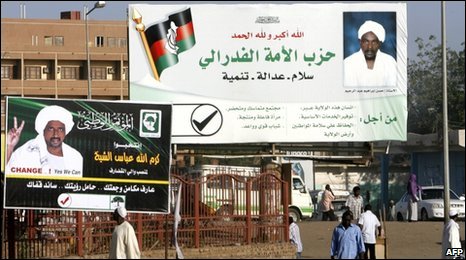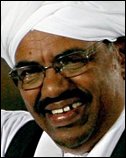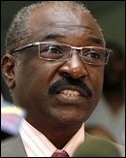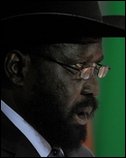Sudanese voters head for the polls from 11-13 April to elect their next president and 450-member National Assembly, in what has been billed as the country's first democratic election in 24 years. They will also elect the governors and legislative bodies of the county's 25 states, while the semi-autonomous southern region - up until 2005 involved in a drawn-out civil war with the dominant north - will choose its own regional president and 171-seat assembly. But the process has been thrown into confusion by the decision of the former southern rebel group
Sudan People's Liberation Movement (SPLM)
to boycott the presidential election and the parliamentary vote across much of the north. The withdrawal of
the National Ummah Party
has cast further doubts on the credibility of the election. The Khartoum authorities insist that the vote will go ahead as normal even though only minor opposition parties are left contesting the polls in northern areas.
What is at stake?
Democracy When President Omar al-Bashir seized power following a bloodless coup in 1989, the activities of all political parties and trade unions were frozen for 10 years. Moves towards the restoration of democracy led to the registration of political parties from 1999. Most opposition parties however boycotted the 2000 elections, in which Mr Bashir was declared the winner amid widespread claims of rigging. This year's elections were viewed as a test of the country's ability to function as a democracy, although that must be in doubt after the opposition boycott. The electoral commission says 81% of all eligible voters have registered to vote. Darfur/arrest warrant The president has campaigned openly in the war-torn Darfur region, where the opposition NUP party historically had a strong support base. The UN says pro-government Arab militias have been involved in a campaign of ethnic cleansing against non-Arab locals. Up to 300,000 people have died from the combined effects of war, famine and disease in Darfur, according to the UN.
Mr Bashir is the first sitting head of state to be the subject of an arrest warrant issued by the International Criminal Court. He faces seven counts of war crimes and crimes against humanity allegedly committed in Darfur. Mr Bashir vigorously denies the charges. By March 2010 the government had signed ceasefire deals with two main rebel groups in Darfur. But doubts persist about the level of preparedness for elections in the region, where millions have been displaced by the conflict. South Sudan referendum The elections are also seen as a prelude to a referendum on independence in autonomous Southern Sudan scheduled for January 2011. The vote is part of the 2005 Comprehensive Peace Agreement which ended two decades of civil war between the predominantly Muslim north and the Christian and animist south. The treaty set up a unity government of the ruling northern
National Congress Party (NCP)
and the former rebel Sudan People's Liberation Movement (SPLM). Their coalition has been an uneasy one, however, marked by frequent disputes and mutual distrust. The idea of secession is popular in the south. President Bashir favours Sudan's continued unity, but has promised to respect the outcome of the referendum.
How have the boycotts affected the election?
The SPLM's presidential candidate, Yasir Arman, announced late in March that he was withdrawing from the national presidential race, citing alleged irregularities and the continued application of emergency laws in Darfur. Since then, the SPLM has also said it will also boycott the parliamentary elections in 13 of the 15 northern states. In early April the opposition National Ummah Party announced its total withdrawal from presidential, parliamentary and state elections over fears of vote-rigging. The boycott means that Mr Bashir will no longer face the man he deposed in 1989, former prime minister Sadiq al-Mahdi, who had been the NUP's candidate. The authorities insist the elections will go ahead despite the opposition boycott, which one electoral official termed "meaningless".
What happens on polling day?
Polling stations will open from 0500-1500 GMT. In order to win, a presidential candidate must gain more than 50% of all the votes cast. The result is expected to be announced on 18 April. If there is no clear winner, the two leading candidates will enter a second-round run-off on 10 May. The president can serve a maximum of two five-year terms.
Who are the main players?
1) Omar Hasan Ahmad al-Bashir - NCP
President Omar Hasan al-Bashir of the ruling National Congress Party (NCP) was born in 1944 in the Nile River state in the north. He belongs to the Al-Ja'alyin tribe, one of the country's main ethnic groups. In June 1989, Mr Bashir, a leading army officer, led a mutiny against the then prime minister, Sadiq al-Mahdi, saying he wanted to "save the country from rotten political parties". He has run the country ever since. His party, the NCP, emerged from the Islamist NIF, which is strongly opposed to secularism and was responsible for introducing Islamic Sharia law in all provinces but the south.
Full profile
2) Hatim al-Sirr Ali - DUP
Hatim al-Sirr Ali is the candidate of the opposition Democratic Unionist Party-Original (DUP), which is headed by Muhammad Uthman al-Mirghani, a scion of a prominent political family. Muhammad Uthman al-Mirghani is also the head the Khatmiyyah Sufi sect that enjoys huge support among Sudanese Muslims, especially in the east. The Khatmiyyah supporters believe that the Mirghanis are descendants of Prophet Muhammad. Mr Ali was born in the central state of Al-Jazirah, and is a member of the Shayqi tribe. Aged 50, he is one of younger presidential candidates. 3) Salva Kiir Mayardit - SPLM
Salva Kiir Mayardit, chairman of the Sudanese People's Liberation Movement (SPLM), is seeking to retain his position as president of the Southern Sudan government. He is also Mr Bashir's first vice president. Salva Kiir was born in 1951 in the southern Bahr-al-Ghazal state and belongs to south Sudan's largest ethnic group - the Dinka. He joined the southern "liberation war" in the early 1960s, and the then SPLM guerrilla movement in 1983. Mr Kiir replaced John Garang as president of south Sudan in 2005 following Mr Garang's death in a helicopter crash. His only challenger, Lam Akol, is standing on the ticket of the splinter SPLM-DC party.
Full profile
What about the legislative race?
Around a quarter of the candidates for the National Assembly and South Sudan's Legislative Assembly are standing as independents. A large number of candidates for governor of each of the 25 states are also running as independents. Many voters will be participating in elections for the first time and are likely to find the process complex as it requires voters to complete eight ballots (or up to 12 ballots in the south). These include ballots for district lists, women's lists and local assemblies in addition to ballots for the national and regional leaders (in the case of South Sudan).
What about women candidates?
According to figures published before the opposition parties' boycott, there were more than 1,000 women candidates representing diverse political parties contesting seats set aside for women in the National Assembly and over 2,000 women candidates running for local state assemblies. They have ignored a fatwa (religious ruling) by Salafist Muslim scholars prohibiting women from standing in the elections. Although Sudan's constitution does not explicitly declare Islam the country's official religion, it says Sharia is the source of legislation in northern Sudan.
Who are the observers?
The electoral commission has accredited 250,000 local and international election observers. The Sudan Domestic Election Monitoring and Observation Programme (a local non-governmental organisation) is deploying more than 700 observers. The US-based Carter Center is sending 60 observers. There will also be observers from the African Union, the Arab League and the European Union and from China. On 7 April the European Union withdrew its observers from the Darfur region over security fears.
BBC Monitoring
selects and translates news from radio, television, press, news agencies and the internet from 150 countries in more than 70 languages. It is based in Caversham, UK, and has several bureaux abroad.
|

~RS~q~RS~~RS~z~RS~57~RS~)








Bookmark with:
What are these?